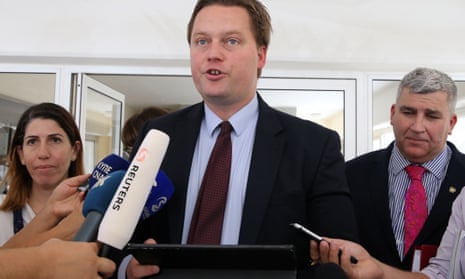The trial of a British woman accused of fabricating rape claims has been adjourned for two weeks in Cyprus, prolonging court proceedings closely watched on the island, in the UK and Israel.
The teenager, who has denied falsely claiming she was raped by 12 Israeli youths in a hotel room in the party resort of Ayia Napa, broke down in tears when she was told the hearing at Famagusta district court would be postponed until 15 October to allow her legal team to examine evidence unexpectedly produced by the prosecution.
She was kept in custody for a month and is now living in a safe house in Nicosia. Her passport has been confiscated. Judge Michalis Papathanasiou refused on Wednesday to let her return to Britain before the end of the case.
In August the 19-year-old entered a plea of not guilty to the charge of fomenting public mischief, an offence punishable by up to a year in prison.
Defence lawyers, who describe the student as suffering from post-traumatic stress disorder following the alleged gang rape in July, requested time to examine a report detailing material gleaned from the Israelis’ mobile phones.
The new evidence, which includes text messages and pictures exchanged among the Israelis, offered further proof she was raped, they contended. All of the alleged assailants, aged between 15 and 18, have vehemently denied the accusation.
The legal aid group Justice Abroad, which is assisting the Briton, insisted on Wednesday that she was compelled to revoke the complaint under duress. Speaking to reporters outside the two-storey court building in Paralimni, Michael Polak, a human rights lawyer with the group, said: “We say a rape did occur, and there has been an investigation which falls way below any proper standard of investigation. Cyprus is a wealthy country and a developed country but nothing within that police station is recorded on audio or video, which is amazing.”
As a result, the Israelis – who were initially detained but then allowed to return home when the charges were dropped – would never be properly investigated. Suggestions of police mishandling have been robustly rejected by authorities.
The British woman, who cannot be named unless found guilty, saw her status change from victim to accused when, according to police officers on the Mediterranean island, she willingly recanted the criminal charge.
The defence argues the confession was forcibly extracted during eight hours of questioning which ended when the woman admitted at 2am to concocting the “imaginary crime” in a document that was dictated to her.
Ahead of the trial, scheduled to last three days when it resumes, the defence lawyers made clear they would argue that the island’s reputation as a prime tourist destination had also played a role. Police, they claim, had been under immense pressure to wrap up the inquiry for fear it would wreck the tourist season. Israelis have increasingly travelled to Cyprus on holiday in recent years.
The Briton, who covered her face as she walked into the court, was held for over a month in Nicosia general prison, sharing a cell with nine other women before being granted bail in August.
She has been obliged to report to a local police station three times a week.
On Wednesday, Papathanasiou relaxed that requirement and ruled that she could report to police once a week.
However, he refused to let her return to Britain to commence her studies before the court case was over.
“There have been concerns for her wellbeing,” said one source in close contact with the Briton. “She is in a very fragile state and psychologically vulnerable. A lot of people on this island are very angry at what has happened. They feel it has badly affected tourism especially in Ayia Napa.”









